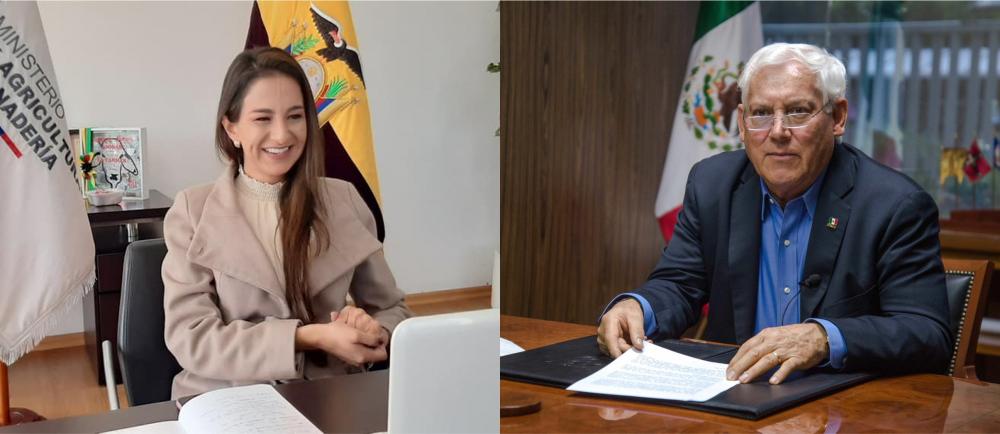Organic production is in growing demand and holds great potential for Latin America and the Caribbean

San José, 25 June 2021 (IICA) - Organic agriculture will play an important role in the recovery of Latin American and Caribbean countries after the pandemic, due to its contributions to sustainable development and the growing consumer demand for healthy and reliable food.
Participants in the seminar "Contribution of organic production to the transformation of Agrifood Systems" agreed on this assessment, including the recently appointed Minister of Agriculture and Livestock of Ecuador, Tanlly Vera Mendoza, and the Secretary of Agriculture and Rural Development of Mexico, Victor Villalobos.
The debate was organized by the Inter-American Institute for Agricultural Cooperation (IICA) and the Inter-American Commission on Organic Agriculture (CIAO), with the objective of sharing the benefits of organic/ecological production and its major contribution to the fulfillment of the Sustainable Development Goals (SDGs), including the fight against climate change, the protection of biodiversity, the reduction of hunger and access to clean water for all.
“Our participation in this seminar reflects our interest in becoming part of the world of organic agriculture, which maintains and improves the health of soils, ecosystems and biodiversity. The pandemic has taught us many important lessons. We have seen a significant increase in the demand for organic products, which represents a new challenge for Ecuador" said Minister Vera Mendoza, who conveyed the support of her country's new president, Guillermo Lasso, for the event.
Secretary Villalobos emphasized that "organic agriculture has shown its contributions to sustainable development, through good practices that generate social and environmental benefits". Villalobos highlighted that there is a growing number of small producers, women and young people dedicated to organic agriculture and specified that Mexico already has 1,143,000 certified hectares distributed in the 32 states of the country where coffee, rice and sorghum are grown and poultry meat, milk and honey are also produced.
Maciej Golubiewski, Chief of Staff of the Commissioner for Agriculture of the European Commission, highlighted the commitment of the European Union to organic production, a fact that has been reflected in the objective set for 2030, by which 25% of the land must be destined for that type of agriculture.
On behalf of the Ministry of Agriculture, Fisheries and Food of Spain, José Miguel Herrero Velasco, General Director of Food Industries, warned that “the world is at a crucial point, where the challenge is how to emerge stronger from this crisis. Agriculture and the food industry will surely play a fundamental role”.
Herrero Velasco stated that one of Spain's priorities is to encourage the consumption of organic food and generate the conditions “so that organic products are not for an elite, but within the reach of any consumer, in order to strengthen the value chain”.
IICA's Representative in Argentina and Coordinator for the Southern Region, Caio Rocha, highlighted the increasingly prominent role that organic production plays, and provided conclusive figures: "The growth rate of the surface area used for this type of organic crops has been 9.3% per year between 2013 and 2019, and this number is expected to continue rising. Organic production will be crucial for post-pandemic recovery and for the social and economic development of the agricultural sector”.
For his part, Lloyd Day, Deputy Director General of IICA, highlighted the role of organic agriculture and referred to the three main principles defined by the Institute in agreement with its 34 Member States. These will be the basis for the messages presented by the Americas in the 2021 Food Systems Summit, convened by the United Nations, which are: farmers must sit at the discussion table; science must be the basis of the policies adopted; and agriculture is part of the solution to the challenges facing humanity.
“Many people claim that agriculture is a problem for climate change. But we believe that innovations are already underway to ensure its sustainability”, said Day.
In his closing remarks, the president of CIAO, Rommel Betancourt, stated that "one of the main challenges ahead is to continue with the positioning and promotion of organic production, as it constitutes a tool for environmental protection and social development".
Also participating in the conference were Ana Posas Guevara, Agriculture and Plant Protection Officer for Latin America and the Caribbean of FAO, Diego Canga Fano, Principal Advisor of the Directorate-General of Agriculture and Rural Development of the European Commission; Concha Fabeiro Cortés, President of the Spanish Society of Ecological Agriculture (SEAE); Sandra Verdu Bütikofer, President of INTERECO, Association of Public Authorities for the Control of Organic Production in Spain; Álvaro Barrera Fernández, president of ECOVALIA, an association that promotes organic production in Spain; and Peggy Miars, from the International Federation of Organic Agriculture Movements (IFOAM).
More information:
Institutional Communication Division.
comunicacion.institucional@iica.int